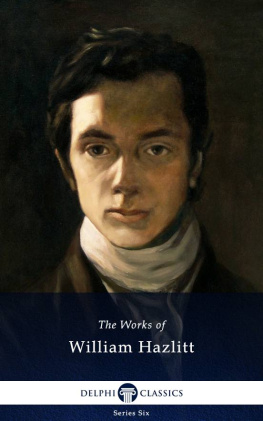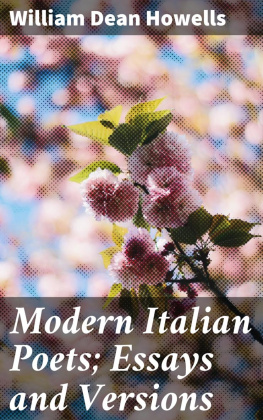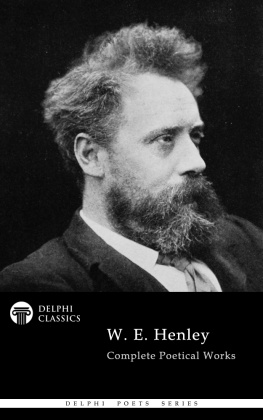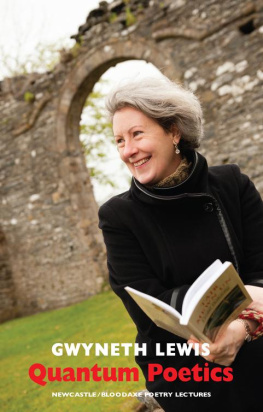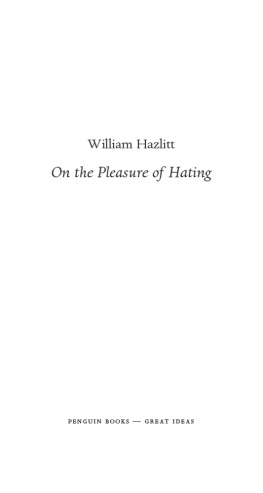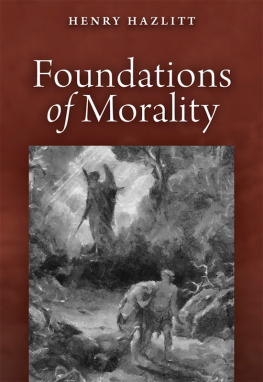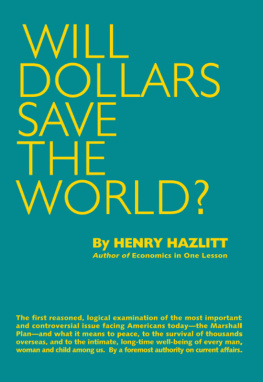William Hazlitt - Lectures on English Poets
Here you can read online William Hazlitt - Lectures on English Poets full text of the book (entire story) in english for free. Download pdf and epub, get meaning, cover and reviews about this ebook. year: 2000, publisher: 1873 Press, genre: Science. Description of the work, (preface) as well as reviews are available. Best literature library LitArk.com created for fans of good reading and offers a wide selection of genres:
Romance novel
Science fiction
Adventure
Detective
Science
History
Home and family
Prose
Art
Politics
Computer
Non-fiction
Religion
Business
Children
Humor
Choose a favorite category and find really read worthwhile books. Enjoy immersion in the world of imagination, feel the emotions of the characters or learn something new for yourself, make an fascinating discovery.

- Book:Lectures on English Poets
- Author:
- Publisher:1873 Press
- Genre:
- Year:2000
- Rating:5 / 5
- Favourites:Add to favourites
- Your mark:
- 100
- 1
- 2
- 3
- 4
- 5
Lectures on English Poets: summary, description and annotation
We offer to read an annotation, description, summary or preface (depends on what the author of the book "Lectures on English Poets" wrote himself). If you haven't found the necessary information about the book — write in the comments, we will try to find it.
Lectures on English Poets — read online for free the complete book (whole text) full work
Below is the text of the book, divided by pages. System saving the place of the last page read, allows you to conveniently read the book "Lectures on English Poets" online for free, without having to search again every time where you left off. Put a bookmark, and you can go to the page where you finished reading at any time.
Font size:
Interval:
Bookmark:
William Hazlitt
1873 Press
First Published 1825
All rights reserved under International and Pan-American Copyright Conventions.
Published in the United States by 1873 Press, New York.
1873 Press and colophon are trademarks of Barnes & Noble, Inc.
Book Design by Ericka O'Rourke, Elm Design
www.elmdesign.com
ISBN 0-594-04108-2
HAZLITT'S Lectures on the English Poets were delivered at the Surrey Institution in 1818, and were published in the same year. Sergeant Talfourd was present at their delivery, and it is interesting to note what so acute a person as he thought of them at the time. They formed one of three courses of lectures at the same place, the other two being On the English Comic Writers and On the Literature of the Age of Elizabeth. The audience, we are told, "consisted chiefly of Dissenters, who agreed with him in his hatred of Lord Castlereagh, but who 'loved no plays;' of Quakers, who approved him as the opponent of slavery and capital punishment, but who 'heard no music;' of citizens, devoted to the main chance, who had a hankering after 'the improvement of the mind,' but to whom his favourite doctrine of its natural disinterestedness was a riddle; of a few enemies, who came to sneer; and a few friends, who were eager to learn and to admire;" an audience, in fact, of varying elements, such as one might expect to find to-day represented in a university extension lecture room. "He once had an edifying advantage over them. He was enumerating the humanities which endeared Dr. Johnson to his mind, and, at the close of an agreeable catalogue, mentioned, as last and noblest, 'his carrying the poor victim of disease and dissipation on his back through Fleet Street'at which a titter arose from some, who were struck by the picture as ludicrous, and a murmur from others, who deemed the allusion unfit for ears polite. He paused for an instant, and then added in his sturdiest and most impressive manner, 'an act which realises the parable of the good Samaritan,' at which his moral and delicate hearers shrunk rebuked into deep silence. He was not eloquent in the true sense of the term; for his thoughts were too weighty to be moved along by the shallow stream of feeling which an evening's excitement can rouse. He wrote all his lectures, and read them as they were written; but his deep voice and earnest manner suited his matter well." In an article on these lectures which appeared in The Westminster Review, a word is used which exactly expresses the prevailing attribute of Hazlitt as a critic: "He handles the subject with great gusto, metaphysical acuteness, and rich illustration." It is this quality of being able to see the highest in poet and novelist and painter and politician and philosopher which makes Hazlitt "the perfect lover, to whom their achievement was as an enchanted garden." Again and again are we made aware of quick intelligence, of thought leaping reponsively to thought, and of a keen capacity to enjoy. It is Hazlitt's gusto which most impresses us when we read his work, whether it be merely a hastily written dramatic notice for The Examiner or a carefully thought out "character." He had read widely, and, though he was imperiously careless in the matter of quotations, the way in which he presses the words of others into his own service, in order to emphasise something which he wished to point out in the character or works of the author under discussion, is nearly always happy and appropriate. He is ever alive and alert; he enjoyed life; he loved many thingswomen and pictures and plays and poems; he saw the good in prize-fighting (who does not know his account of the fight between Hickman and Bill Neate?) and was himself a fives-player; he hated and he loved; he was, says Thackeray, "one of the keenest and brightest critics that ever lived;" and the truth of his last words"Well, I've had a happy life "can be seen in every volume of his works. A good deal of this happiness arose, doubtless, from his love of strife; he had what has been called "a fine pugnaciousness of mind;" he indulged in many quarrels and he did not shrink from entrance to a quarrel; he was akin, in spirit, to the man who is always "agin the government;" but, setting all this on one side, let it be said as his supreme virtue that he really loved what was great, and when a man is blessed with the capacity for that love he has a source of happiness within himself which nothing can take away.
It would be impertinent to point out the various good qualities of the lectures which are contained in this present volume: their virtues are self-evident; but a word of warning may be allowed. Hazlitt is often a creature of prejudice, of prejudice so irrational as to make him uncritical. His very individuality, his originality, is sometimes a snare; he never enjoyed running in double harness, and he sometimes kicks over the traces from sheer wilfulness. He can be hopelessly unjust, as in the essay on Scott in The Spirit of the Age, in the present volume; but you have only to turn to the lecture on Burns, or to the criticism of Pope, or to the well-known passage on Coleridge towards the close of the lecture On the Living Poets, to be in the presence of one who knows what genius is and can appraise it.
Hazlitt replied in the savage Letter to William Gifford. Both review and reply belong, let us hope, to a school of criticism that is dead. The attack might easily have aroused a less fiery nature than Hazlitt's to reprisals; and the rejoinder does not fall short of what might be expected.
The Spirit of the Age was published anonymously in January 1825, with a characteristic motto upon the title page"To know another well were to know one's self well." A second edition was published in the same year, with additions to the article on Coleridge and an essay on Cobbett which had previously been published in Table Talk. Some of the "contemporary portraits" had appeared in The New Monthly Magazine and The London Magazine. In the interval between The English Poets and The Spirit of the Age, Hazlitt had published his Lectures on the English Comic Writers, the "quintessential salt of an epistle" to William Gifford above referred to, his Political Essays, his Lectures on the Dramatic Literature of the Age of Elizabeth and his Table Talk, besides many articles in journals and newspapers which were collected later. The Spirit of the Age, naturally, is more mature than some of the earlier volumes and it contains some of the very best of Hazlitt's work. It is a splendid portrait-gallery, wherein some of his contemporaries appear in the pillory and others in frames of honour. He had earned Coleridge's praise earlier in respect of his power as a painter of character portraits; and here we have his impressions of a score or more of his contemporaries related in the style which led R. L. Stevenson to declare "we are mighty fine fellows, but we cannot write like William Hazlitt." With his politics we may not agree, and it needs but little education in literary history to be able to detect his prejudices; allowances have to be made for this and for that; but, when the devil's advocate has said his worst, there remains, in the two volumes here reprinted and in those which saw the light between their dates of publication, such a series of critical essays upon men and manners as no one in England had produced before. The only person with whom Hazlitt can be compared is Sainte-Beuve. He is not so "safe" as the French critic; he is not so careful; he lacks that lucidity of style which apparently is the inalienable birthright of all French critics; but there is more vigour in him than there is in the southern writer, less of that cool detachment which may chill the enthusiastic but which is a healthy corrective against prejudice.
Font size:
Interval:
Bookmark:
Similar books «Lectures on English Poets»
Look at similar books to Lectures on English Poets. We have selected literature similar in name and meaning in the hope of providing readers with more options to find new, interesting, not yet read works.
Discussion, reviews of the book Lectures on English Poets and just readers' own opinions. Leave your comments, write what you think about the work, its meaning or the main characters. Specify what exactly you liked and what you didn't like, and why you think so.

